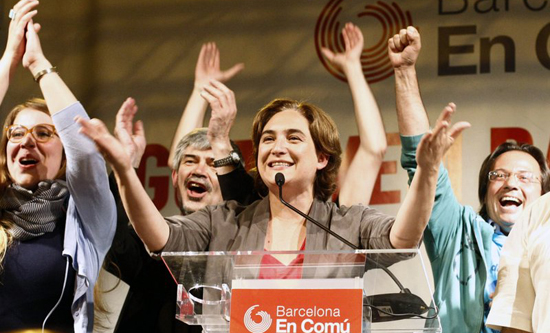
The results of Spain’s regional and municipal elections held on 24 May mark a sea-change in Spanish politics as millions of voters rejected the austerity policies of the ruling Popular Party (PP). In Spain’s two biggest cities, Madrid and Barcelona, left-wing activists are set to become mayors. New radical coalitions are emerging that could have a significant impact in the general election in November. JUANJO RIVAS reports from Madrid.
While the conservative PP still received the most support (27%), it has lost 2.5 million votes since the 2011 local elections. This allowed left-wing coalitions, backed by the new left-wing party Podemos, to make significant gains. Although Podemos itself only received 12% of the vote, it may well gain important conservative strongholds, such as Madrid, Asturias, Valencia and Galiza if it forms alliances with the socialist democratic Socialist Party (PSOE), which was second overall.
Austerity and repression
Ahead of the election, as opinion polls predicted that the PP would be punished by voters for years of austerity and a string of corruption scandals, Mariano Rajoy and his ministers tried to talk up the alleged recovery of Spain’s badly-damaged economy, claiming growth this year would be 2.9%. But their claims were undermined when Spain’s business association refused to negotiate any pay rise above 1%. A slight fall in unemployment is due largely to the growth of so-called ‘junk jobs’ on temporary, low-paid contracts. Labour conflicts are increasing and there have been strikes by workers from the mobile phone company Movistar, post office staff and several others.
Spanish people are also fed up with the ongoing avalanche of corruption cases. During the election campaign itself, PP members were caught trying to post piles of fraudulent postal ballots in Melilla, a Spanish colony in Morocco.
Repression has been systematically used against the most radical sections of the working class. On 30 April, 15 anarchists were arrested and accused of belonging to a criminal organisation which carried out acts of sabotage. They were sentenced to three years’ imprisonment. Three police operations since November 2014 have led to the arrest of over 50 activists charged with making ‘terrorist threats’ online. In 2011, after thousands of people surrounded the Catalonian parliament and stopped politicians from entering, eight people were arrested but acquitted of all charges. On 17 March, the Supreme Court revoked that verdict, and enforced three-year prison sentences. In early May, the Spanish High Court sentenced seven young Basques to six years for membership of the banned youth nationalist organisation Segi. Undercover police arrested four before the sentence was made public. The other three went underground until 17 May, when they joined 8,000 people marching in solidarity with them in Vitoria. Protestors used costumes, masks, wigs and paint to make it difficult for police to recognise the three fugitives. Surrounded by police, demonstrators chained themselves together forming a ‘human wall’ of resistance. Police took three hours to break the chains before seizing the three. (Watch at www.youtube/watch?v=9I7a0ktukMo)
On 6 May, the European Commission for Human Rights condemned Spain for the seventh time for failing to investigate torture under detention. Moreover, the United Nations has also issued a very critical report about the set of draconian legal reforms known as the ‘gag law’ (see FRFI 243), which come into effect in June.
The winds of change?
New political organisations have emerged at municipal level from the local struggles that began in 2008. Podemos was created in January 2014 and won significant support in last year’s European election. Rather than stand separately for these elections, it joined local coalitions in which grassroots movements chose the list of candidates. This strategy has resulted in women becoming mayors of Barcelona and Madrid. In Barcelona, Ada Colau, a well-respected anti-eviction activist has already announced a radical agenda after the En Comu coalition, backed by Podemos, won the most council seats. This includes cutting €4m in sponsorship to the city’s prestigious Grand Prix race track to subsidise school meals for poor children, targeting 10,000 empty homes in the city for shelter for the homeless and a reduction of official salaries. She will still need to win support from other left-of-centre forces, including radical Catalan nationalists and the social democratic Socialist Party. In Madrid, Podemos candidate Manuela Carmena, a human and labour rights judge, is likely to become mayor after 25 years of conservative rule. Other similar left-wing blocs have seized enough political space to take councils out of the hands of the PP. The conservatives can join forces with a new right-wing party called Ciudadanos, but it won only 6% of the vote and in most regions could not prevent the left-wing coalitions from taking over many town councils.
The rise of Podemos has raised contradictions within the popular movement. Podemos is seen as having become less radical in its demands since its success in the European election last year and is, in any case, likely to have to make an alliance with the decaying PSOE to gain power. There are fears it is drifting further from its grassroots base. However, at the same time, PSOE needs to make concessions if it is to hold onto its traditional working class support. This may force it to agree a radical social programme with Podemos. The next months will decide whether there is an electoral alternative to traditional bourgeois politics and whether a surge of votes cast in anger to punish the old parties can be transformed into votes of confidence in a new movement and a new direction. The social movements will have to play a central role in demanding transparency and accountability from their representatives and ensuring popular participation, so that an empowered working class can begin to drive forward the politics of the future.
Fight Racism! Fight Imperialism! 245 June/July 2015




